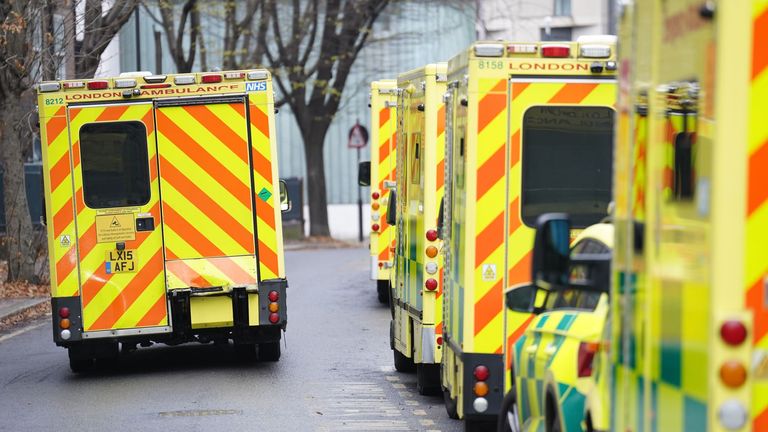The prime minister found talks on the NHS crisis “highly valuable”, his spokesperson has said, as the health secretary tweeted two possible “solutions” that may help solve challenges in the sector.
It came after a day in which ministers, health leaders and clinical experts met at Number 10 in an attempt to solve short and long-term issues facing the health service.
Senior doctors have said the NHS is in a very precarious situation, with A&E units struggling with demand and health trusts and ambulance services declaring critical incidents.
Strikes and high numbers of flu and COVID-19 patients are increasing the pressure.
England’s chief medical officer Professor Sir Chris Whitty and NHS England chief executive Amanda Pritchard were among those at the NHS Recovery Forum.
A government spokesperson said: “The Prime Minister expressed his deep gratitude to the health and social care experts who attended today’s forum – and to the wider workforce they represent for all their hard work and dedication especially during the pandemic.
“He and health ministers found today’s discussions highly valuable for sharing ideas and best practices that could be spread nationwide to improve care for patients throughout the country.
“The prime minister has made it one of his top five priorities to reduce NHS waiting lists so that people get care more quickly and the government is investing a record amount in the health service, including in recruiting a record number of doctors and nurses.”
The spokesperson added that the “next steps will be set out in due course”.
The talks were set to focus on four key issues: reducing delays in discharging hospital patients to social care; how to improve A&E and ambulance service performance; cutting waiting times for operations; and relieving pressure on GPs.
Health Secretary Steve Barclay also put out a tweet in which he said at least two possible solutions to some of the issues had been identified.
He said on Twitter: “Innovation is crucial to solving the challenges facing the NHS.
“We’re identifying solutions – including virtual wards & a new fall service [for people injured by falls and trips] that can save 55,000 ambulance callouts a year.
“Great to meet with health & care leaders today to see how we can go further and faster.”
It is understood the “fall service” refers to the potential rolling out of a falls prevention service that aims to prevent falls in elderly people who then require unnecessary admission to hospital.
The service already operates in some local areas and it is thought the government may be looking at making it nationwide. One such service in central London provides assessment, advice and exercise for older people who are at risk of falling.
Labour earlier said the talks, joined by Treasury minister John Glen, were a “talking shop” and patients “deserve more”.
The British Medical Association, which represents doctors, wasn’t at the talks but has urged the PM to negotiate with striking health workers – such as nurses – who are seeking more pay.



